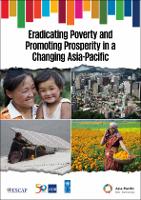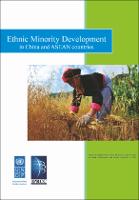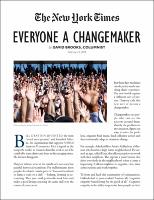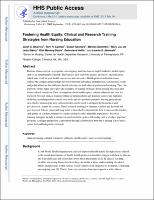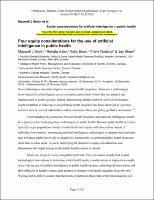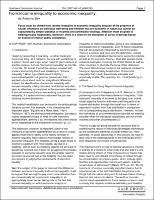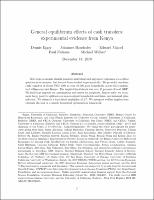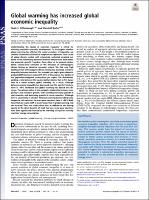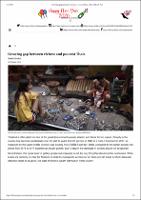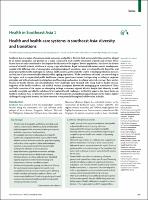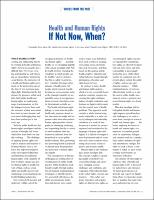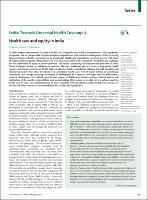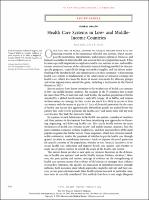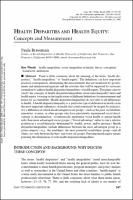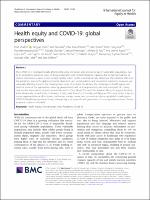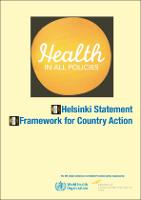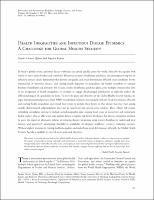Browsing by Title
Now showing items 87-106 of 229
-
Eradicating Poverty and Promoting Prosperity in a Changing Asia-Pacific
(United Nations, 2017-03-01)
This report is produced under a renewed partnership between United Nations (ESCAP), ADB, and the United Nations Development Programme (UNDP) to support national and regional efforts to implement the 2030 Agenda for Sustainable Development. It explores five megatrends that will determine whether everyone will be able to thrive and fulfill their expectations for a better life in the future: regional economic cooperation and integration; rural–urban transitions; demographic changes; ICT access and connectivity; and demand for natural resources. It ... -
Ethnic Minority Development
(2013)
This paper was presented in the sixth China-ASEAN Forum on Social Development and Poverty Reduction, which was held on 26-27 September 2012 in Liuzhou, China. The forum was supported under the UNDP-IPRCC project. Southeast Asia and China together constitute nearly half of the total global ethnic minority population. This chapter will address the challenge of the development of ethnic minority groups in the ASEAN region, and China -
Everyone a changemaker
(The New York Times, 2018-02-09) -
Eyewitness: VIETNAM WAR
(DK Publishing, Inc.)
The Vietnam War remains one of the most heroic and heartbreaking events in history. This definitive guide charts the unforgettable story of the world's first televised war. Hundreds of insightful images and a compelling narrative combine to chronicle this catastrophic conflict.?? From 1955, the communist government of North Vietnam waged war against South Vietnam and its main ally, the USA. Over the course of two decades of hostility and warfare, the number of casualties reached an incomprehensible three million people. Detailed descriptions of ... -
Fostering Health Equity: Clinical and Research Training Strategies from Nursing Education
(The Kaohsiung Journal of Medical Sciences, 2009)
Racism, ethnocentrism, segregation, stereotyping, and classism are tightly linked to health equity and social determinants of health. They lead to lack of power, money, resources, and education which may result in poor health care access and outcomes. Health profession faculties must address the complex relationships that exist between individual, interpersonal, institutional, social and political factors that influence health outcomes in both clinical and research training. Thus, the purposes of this paper are to provide examples of training ... -
From income inequality to economic inequality.
(Southern Economic Journal, 1997)
Focus must be shifted from income inequality to economic inequality because of the presence of causal influences on individual well-being and freedom that are economic in nature but cannot be expounded by simple statistics of incomes and commodity holdings. Attention must be given to heterogeneous magnitudes. Moreover, there is a need for the derivation of partial orderings based on explicit or implicit public acceptance. -
General Equilibrium Effects of Cash Transfers: Experimental Evidence from Kenya
(National Bureau of Economic Research, 2019-12)
How large economic stimuli generate individual and aggregate responses is a central question in economics, but has not been studied experimentally. We provided one-time cash transfers of about USD 1000 to over 10,500 poor households across 653 randomized villages in rural Kenya. The implied fiscal shock was over 15 percent of local GDP. We find large impacts on consumption and assets for recipients. Importantly, we document large positive spillovers on non-recipient households and firms, and minimal price inflation. We estimate a local fiscal multiplier ... -
Global warming has increased global economic inequality
(2019-05-14)
Significance We find that global warming has very likely exacerbated global economic inequality, including ∼25% increase in population-weighted between-country inequality over the past half century. This increase results from the impact of warming on annual economic growth, which over the course of decades has accumulated robust and substantial declines in economic output in hotter, poorer countries—and increases in many cooler, wealthier countries—relative to a world without anthropogenic warming. Thus, the global warming caused by ... -
Global warming has increased global economic inequality
(The Journalist's Resource, Shorenstein center on media, politics and public policy, Harvard Kennedy School, 2019-05-14)
Significance We find that global warming has very likely exacerbated global economic inequality, including ∼25% increase in population-weighted between-country inequality over the past half century. This increase results from the impact of warming on annual economic growth, which over the course of decades has accumulated robust and substantial declines in economic output in hotter, poorer countries—and increases in many cooler, wealthier countries—relative to a world without anthropogenic warming. Thus, the global warming caused by ... -
Group inequality and intersectionality
(E-Bulletin of the Human Development & Capability Association, 2014-07) -
Growing gap between richest and poorest Thais
(the ASEAN Post, 2019-10-25) -
Health and health-care systems in southeast Asia: diversity and transitions
(The Lancet, 2011-01-25)
Southeast Asia is a region of enormous social, economic, and political diversity, both across and within countries, shaped by its history, geography, and position as a major crossroad of trade and the movement of goods and services. These factors have not only contributed to the disparate health status of the region's diverse populations, but also to the diverse nature of its health systems, which are at varying stages of evolution. Rapid but inequitable socioeconomic development, coupled with differing rates of demographic and epidemiological ... -
Health and Human Rights: If not now than when?
(American Journal of Public Health, 2006-11) -
Health care and equity in India
(The Lancet, 2011)
In India, despite improvements in access to health care, inequalities are related to socioeconomic status, geography, and gender, and are compounded by high out-of-pocket expenditures, with more than three-quarters of the increasing financial burden of health care being met by households. Health-care expenditures exacerbate poverty, with about 39 million additional people falling into poverty every year as a result of such expenditures. We identify key challenges for the achievement of equity in service provision, and equity in financing and ... -
Health care systems in low- and middle-income countries
(Massachusetts Medical Society, 2014-02-06)
This review draws on what is now quite an extensive literature on the deficiencies of health care systems and on the Health Systems Evidence database. However, the poor quality and uneven coverage of evidence on the strengthening of health care systems means that evidence of deficiencies is stronger than evidence of remedies. Moreover, the specific circumstances of individual countries strongly influence both decisions about which approaches might be relevant and their success, so any generalizations made from health systems research in particular ... -
HEALTH DISPARITIES AND HEALTH EQUITY: Concepts and Measurement
(Annual Review of Public Health, 2006)
There is little consensus about the meaning of the terms “health disparities,” “health inequalities,” or “health equity.” The definitions can have important practical consequences, determining the measurements that are monitored by governments and international agencies and the activities that will be supported by resources earmarked to address health disparities/inequalities or health equity. This paper aims to clarify the concepts of health disparities/inequalities (used interchangeably here) and health equity, focusing on the implications of ... -
Health equity and COVID-19: global perspectives
(2020-12)
The COVID-19 is disproportionally affecting the poor, minorities and a broad range of vulnerable populations, due to its inequitable spread in areas of dense population and limited mitigation capacity due to high prevalence of chronic conditions or poor access to high quality public health and medical care. Moreover, the collateral effects of the pandemic due to the global economic downturn, and social isolation and movement restriction measures, are unequally affecting those in the lowest power strata of societies. To address the challenges to ... -
Health in all policies: Helsinki statement. Framework for country action
(World Health Organization, 2021)
The participants to the 8th Global Conference on Health Promotion endorsed the Helsinki Statement on Health in All Policies In which they prioritize health and equity as a core responsibility of governments to its peoples, affirm the compelling and urgent need for effective policy coherence for health and well-being and recognize that this will require political will, courage and strategic foresight. The participants of the Conference call on governments to fulfill their obligations to their people’s health and wellbeing by taking a number of ... -
Health Inequalities and Infectious Disease Epidemics: A Challenge for Global Health Security
(2014)
In today's global society, infectious disease outbreaks can spread quickly across the world, fueled by the rapidity with which we travel across borders and continents. Historical accounts of influenza pandemics and contemporary reports on infectious diseases clearly demonstrate that poverty, inequality, and social determinants of health create conditions for the transmission of infectious diseases, and existing health disparities or inequalities can further contribute to unequal burdens of morbidity and mortality. Yet, to date, studies of influenza ...

